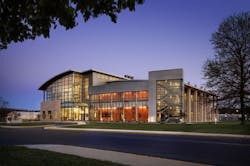A Green Building for Green Research
The $41 million Center for Functional Nanomaterials (CFN) at the Brookhaven National Laboratory (BNL) was recently completed in Upton, NY. One of five U.S. Department of Energy (DOE) Nanoscale Science Research Centers, the CFN's scientific goals are primarily aligned with addressing our national challenges in energy. This new facility, designed by HDR Architecture Inc., provides researchers with state-of-the-art laboratories to explore and develop nanoscale materials aimed at helping the U.S. achieve energy independence. The building is designed to complement the mission by reducing impacts on the environment.
Because of the demanding criteria necessitated by research at the nanoscale, the HDR design team planned the entire 94,500-gross-square-foot building to maximize efficiency and minimize exposure to sources that could impact the environmental stability of laboratories. The building capitalizes on access to natural light with building components organized around a central atrium featuring direct views into the laboratories, thus making the CFN a world-class showcase of its research facilities. The building was recently awarded LEED Silver status.
"Achieving LEED Silver was a team commitment, both from the Brookhaven staff and users and from HDR's architects and engineers," notes Mike Schaeffer, BNL's Project Manager for the CFN project. "We worked closely together to carefully evaluate sustainable options in balance with maintaining the integrity of the laboratory spaces and respecting the budget."
"From the outset, we put together a LEED strategy for the project that included assigning a team of LEED Accredited Professionals as well as a dedicated sustainable design coordinator," explains Ahmad Soueid, HDR Principal/Senior Vice President. "Our challenge was to achieve the highest LEED rating without impacting the cost. Consequently, we identified and employed many "'no-cost' measures. For example, BNL set aside 2.35 acres of land designated to be preserved for the life of the building. This area is more than double the size of the building footprint and provides habitat for vegetation and local wildlife alike."
A stormwater management plan also was implemented which includes features such as bio-retention ponds, increased impervious surfaces and many other sustainable measures. Through additional creative efforts and the use of waterless urinals and low flow lavatories, kitchen sinks and water closets, the team was also able to reduce water use by 46.64 percent above the Energy Policy Act of 1992. Other water conservation measures include the 6.19 acres of native and adaptive plant landscaping around the building which does not require a permanent irrigation system, thus contributing to both water savings and to preservation and restoration of the natural habitat.
"HDR and BNL also collaborated with E.W. Howell, the construction contractors, in implementing a construction waste management program, as well as the procurement of recycled content and regional materials that help maximize the reduction of volatile organic compounds" added Soueid.
The CFN occupies 10 acres on Brookhaven's 5,265-acre campus. The location of the CFN on the BNL campus is an ideal site location for sustainable practices as it provides building occupants prime access to many campus amenities such as an alternative fuel station, a vanpool program, restaurants, post office, bank, and housing.
The CFN is expected to attract an estimated 300 researchers annually from academic, industrial, and research organizations from the northeastern United States and other parts of the world. It is the only Long Island facility dedicated to research into structure and function on the nanoscale, which requires specialized laboratories and instruments.
